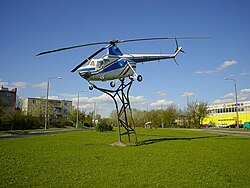Świdnik
| Świdnik | ||
|---|---|---|

|
||
|
||
| Coordinates: 51°13′N 22°42′E / 51.217°N 22.700°ECoordinates: 51°13′N 22°42′E / 51.217°N 22.700°E | ||
| Country |
|
|
| Voivodeship | Lublin | |
| County | Świdnik County | |
| Gmina | Świdnik (urban gmina) | |
| Established | 14th century | |
| Town rights | 1954 | |
| Government | ||
| • Mayor | Waldemar Jakson | |
| Area | ||
| • Total | 20.35 km2 (7.86 sq mi) | |
| Population (2012) | ||
| • Total | 40,186 | |
| • Density | 2,000/km2 (5,100/sq mi) | |
| Time zone | CET (UTC+1) | |
| • Summer (DST) | CEST (UTC+2) | |
| Postal code | 21-040 - 21-047 | |
| Area code(s) | +48 81 | |
| Car plates | LSW | |
| Website | www |
|
Świdnik [ˈɕfʲidɲik] is a municipality in eastern Poland with 40,186 inhabitants (2012), situated in the Lublin Voivodeship, 10 kilometres (6 miles) southeast of the city of Lublin. It is the capital of Świdnik County. Świdnik belongs to the historic province of Lesser Poland, and was first mentioned in historical records in the year 1392. It remained a village until the end of the 19th century when it began to develop as a spa, due to the good location and climate.
In the early Middle Ages, the area of Świdnik was under the authority of a castellan from nearby Lublin. In the location of the current city three villages existed: Adampol, Świdnik and Krępiec (the name of the city itself was later taken from the village which was located in the immediate vicinity of the PZL Świdnik factory).
Świdnik due to its location has to be considered as Satellite town of Lublin, town hosts industrial and advanced technology companies. It is a part of Lublin Agglomeration, extending its business-oriented capabilities.
There are other villages named Świdnik in Poland, as well as Svidnik, a town in Slovakia.
First documented mention of Świdnik comes from the year 1392, and at that time the village was called Świdnik Wielki (Maior Swidnik, Magna Swydnyk). In the early 15th century, Świdnik Mały (Świdnik Minor) appeared in documents, and in 1450, another village, Świdniczek, was mentioned. In 1564, Świdnik Wielki had a folwark, 32 peasants, 14 houses and a public house, and belonged to Lesser Poland's Lublin Voivodeship. After the Partitions of Poland, all three villages briefly belonged to the Habsburg Empire (1795 - 1807). In 1815, they became part of Russian-controlled Congress Poland. During the January Uprising, several skirmishes between Russian units and Polish rebels took place in the area of Świdnik. The biggest one was the Battle of Fajsławice (August 24, 1863), in which 63 Poles were killed. The battle is now commemorated by a monument. In 1877, Świdnik received its first rail connection, on the newly completed Vistula River Railroad. In 1905 - 1914, a red brick station was built; it now is the oldest public utility building in the city.
...
Wikipedia


